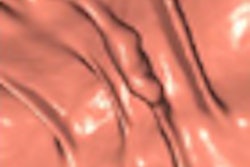A potential new weapon in the arsenal for treating prostate cancer is being discussed at this week's SNM annual meeting in Toronto.
Alpha particle-emitting radiopeptides have proved effective in treating prostate cancer in mice, tripling their average survival rate, researchers reported. Lead author Dr. Damian Wild of the University Hospital Basel in Switzerland stated that this novel form of treatment has the potential to target and destroy cancer cells with minimum damage to surrounding healthy tissue.
Researchers have been able to develop highly specific radiopeptides that bind with tumor cells and treat the tumors with specific therapeutic radioactive substances attached to the radiopeptide. Prostate cancer cells have an overabundance of gastrin-related peptide receptors, which makes this cancer a strong candidate for treatment.
The study conducted by the Swiss researchers compared the outcomes of two different types of radiopeptides with a control group that received no treatment at all. Mice receiving the 213 Bi-DOTA PESIN peptide at the maximum tolerated dose had the highest survival rate.
More than 186,000 men in the U.S. are diagnosed with prostate cancer each year, and more than 30,000 previously diagnosed patients experience cancer recurrence. The cancer in most recurrences cannot be localized and treated adequately with conventional treatments. The researchers hope that their discovery will lead to a systemic treatment that efficiently kills small tumors.
Related Reading
Longer hormone therapy may improve outcomes in advanced prostate cancer, April 15, 2009
SBRT for early prostate cancer shows promising interim results, April 9, 2009
Adding radiotherapy to hormone treatment cuts prostate cancer mortality, December 16, 2008
New tracer shows promise for PET/CT prostate imaging, January 18, 2007
Copyright © 2009 AuntMinnie.com


















